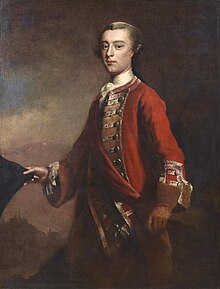James Wolfe
British Army officer (1727–1759)
James Wolfe (2 January 1727 - 13 September 1759) was a British Army officer known for his training reforms and remembered chiefly for his victory in 1759 over the French at the Battle of the Plains of Abraham in Quebec as a major general.


Wolfe's part in the taking of Quebec in 1759 earned him lasting fame, and he became an icon of Britain's victory in the Seven Years' War and subsequent territorial expansion. He was depicted in the painting The Death of General Wolfe, which became famous around the world. Wolfe was posthumously dubbed "The Hero of Quebec", "The Conqueror of Quebec", and also "The Conqueror of Canada", since the capture of Quebec led directly to the capture of Montreal, ending French control of the colony.
Quotes
edit- Gentlemen, I would rather have written those lines than take Quebec tomorrow.
- To his troops, 12 September 1759, after reciting most of Thomas Gray's Elegy, Written in a Country Churchyard the evening before storming Quebec City. Quoted in Francis Parkman's Montcalm and Wolfe (1884), and paraphrased in J. Playfair's "Biographical Account of J. Robinson", Transactions Royal Society of Edinburgh, 7 (1814), p. 499
- Now God be praised, I die contented.
- His last words, on hearing of the defeat of the Americans at Quebec. Quoted in Francis Parkman's Montcalm and Wolfe (1884)